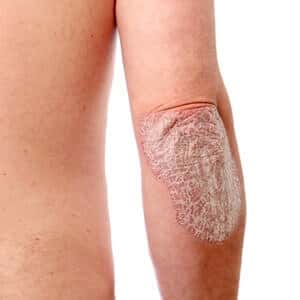
Psoriasis is a common skin condition in which the immune system drives skin cells to divide and develop far too rapidly. As a result, silvery scaly patches, or psoriasis plaques, appear over reddened itchy skin. Elbows, shins, scalp and navel are frequent sites for these plaques. Sometime skin folds or fingernails are also affected. People frequently figure out what triggers their psoriasis flare-ups, but it may be more difficult to find natural approaches that will clear them up.
Resveratrol and Biotin for Psoriasis Plaques:
Q. An article in the newspaper mentioned that a reader’s psoriasis plaques improved when he took biotin along with resveratrol he was on for another purpose. My husband tried it and it is working!
He is seeing slow but steady and significant improvement in his psoriasis by taking these daily. Thank you.
No Science to Back Up This Remedy:
A. We wish we could cite some scientific studies confirming or explaining your husband’s success with such supplements. As far as we can tell, however, there have been no clinical trials involving resveratrol for treating psoriasis. Nevertheless, there are studies suggesting that this antioxidant found in red wine might be beneficial (Lee et al, Oncology Reports, Jan. 2016; Kjaer et al, PLOS One, May 12, 2015).
Biotin is a B vitamin. It has a reputation for improving hair and nails. There are no data on its effect on psoriasis plaques.
Other Supplements That May Help Psoriasis:
On the other hand, readers have reported success with a few supplements for which there is better scientific support. One of these is vitamin D, certain forms of which are used as prescription creams or ointments to treat psoriasis plaques.
Vitamin D:
Q. I have had psoriasis for more than 35 years. A few years ago, my doctor suggested vitamin D, as my blood level was low. Much to my surprise, my psoriasis began to disappear almost immediately. Several patches had proved impossible to cure with other medications. When my blood test showed a normal level of vitamin D, the doctor asked me to cut back the dosage. I did and the psoriasis returned.
I now take 5,000 units of vitamin D capsules per day and that keeps my psoriasis in check. Regular monitoring of my vitamin D level shows that I am in the middle of the acceptable range with this dosage.
A. Dermatologists have embraced topical vitamin D-like prescription creams, foams and ointments for psoriasis (Feldman et al, American Journal of Clinical Dermatology, Aug, 2012). The compound in these products, calcipotriene (Calcitrene, Dovonex, Sorilux), is pricey, however.
Many doctors may have forgotten that oral vitamin D can also be helpful (Barrea et al, Reviews in Endocrine & Metabolic Disorders, online Feb. 7, 2017). More than 25 years ago Japanese researchers noted that oral vitamin D3 reduced the symptoms of psoriasis without side effects (Morimoto et al, British Journal of Dermatology, Oct. 1986).
Be Careful About High-Dose Vitamin D:
It makes sense to give inexpensive vitamin D pills a try, but anyone who uses a dose higher than 4,000 IU daily should ask the doctor to order a blood test, to make sure that the vitamin D level remains, like yours, in the healthy range. We discuss vitamin D, the appropriate dose and how to interpret the blood test in our Guide to Vitamin D Deficiency.
Turmeric:
In addition, many readers have had equal or even better success taking turmeric as a supplement. Here is one representative story:
Q. My father and his mother both had psoriasis on their shins and elbows, so when I developed this problem at age 50, I thought I was just stuck with it.
I started filling gel caps with cooking grade turmeric and taking several each day for joint pain. My joints are healthier, but the psoriasis plaques completely disappeared! We buy turmeric by the pound at East Indian cooking stores.
A. Turmeric (Curcuma longa) is the yellow spice that gives curry powder its distinctive color. One component, curcumin, appears to be responsible for the benefits in psoriasis. Along these lines, Thai researchers have found that curcumin has anti-psoriatic activity in cell lines (Saelee et al, Molecules, May 10, 2011).
Clinical Research:
Unfortunately, clinical trials on the use of turmeric supplements for psoriasis have produced conflicting rather than consistent results. Curcumin is not very well absorbed into systemic circulation, and that might help explain the variability. Recently, dermatologists have been investigating turmeric in a topical microemulgel (Sarafian et al, Iranian Journal of Pharmaceutical Research, Summer 2015).
Other scientists have been experimenting with oral curcumin combined with a widely-used blue light therapy (Carrion-Gutierrez et al, European Journal of Dermatology, May-June 2015; Niu et al, PLOS One, Sep. 18, 2015; Ramirez-Boscá et al, Journal of Dermatology, online Oct. 28, 2016). A systematic review of studies of turmeric for skin health concluded that it is promising, though much research is still needed (Vaughn et al, Phytotherapy Research, Aug. 2016).
Be Aware of a Possible Interaction:
A word of caution for others who plan to try this: turmeric may interact with warfarin (Coumadin) to increase the risk of bleeding. We don’t know if this supplement interacts with other anticoagulants such as dabigatran (Pradaxa) or apixaban (Eliquis). As a result, we advise caution.
Some people also experience allergic reactions to turmeric. Rashes or hives are a signal to stop taking this spice. For more information, you may wish to consult our book, Spice Up Your Health: How Everyday Kitchen Herbs & Spices Can Lengthen & Strengthen Your Life.

